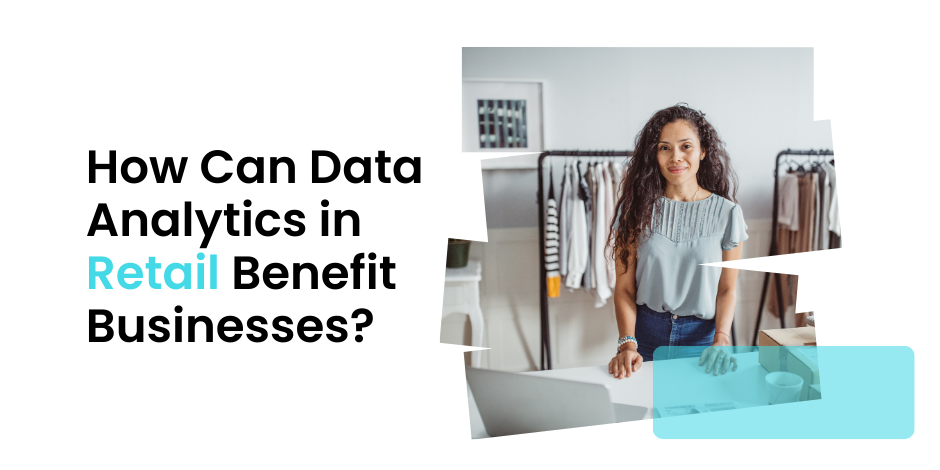How Can Data Analytics in Retail Benefit Businesses?

Stay Informed With Our Weekly Newsletter
Receive crucial updates on the ever-evolving landscape of technology and innovation.
Data analytics has emerged as a powerful tool for retailers to gain valuable insights and make informed decisions.
By harnessing the power of data, retailers can better understand their customers, optimise their operations, and ultimately drive profitability.
We explore the concept of data analytics, its role in the retail industry, the key benefits it offers, and how retailers can successfully implement it.
We also examine real-world case studies and discuss the challenges that come with leveraging data analytics in retail.
Understanding the concept of data analytics

Data analytics refers to the process of examining raw data to uncover patterns, trends, and insights that can inform decision-making.
In the retail context, this involves analysing data collected from various sources such as point-of-sale systems, customer loyalty programs, website analytics, and social media platforms.
By gaining a deeper understanding of customer behaviour, market trends, and operational efficiency, retailers can make data-driven decisions that lead to competitive advantage and growth.
What is data analytics?
Data analytics involves the extraction of valuable insights from large volumes of data through statistical analysis, machine learning algorithms, and predictive modelling techniques.
It enables retailers to identify patterns, correlations, and trends that may not be apparent on the surface. By analysing historical data and real-time information, retailers can gain a comprehensive view of their business and make data-driven decisions.
The role of data analytics in business
Data analytics plays a crucial role in helping businesses understand the past, optimise the present, and predict the future.
By leveraging data analytics, retailers can gain insights into customer preferences, shopping patterns, and purchase history.
This knowledge allows retailers to tailor their offerings to meet customer needs, improve operational efficiency, and drive customer loyalty.
The intersection of data analytics in retail

The retail industry is experiencing a transformational change, with data analytics at the heart of this transformation. As retailers grapple with growing competition and evolving customer expectations, using data analytics in retail has become a critical tool for survival and success.
The importance of data analytics in retail
Data analytics in retail has become vital for retailers to gain a competitive edge in an increasingly crowded market. By analysing customer data, retailers can identify trends, preferences, and behaviour patterns.
This enables them to deliver personalised shopping experiences, target marketing campaigns, and optimise inventory management.
How retailers are currently using data analytics
Retailers are utilising data analytics in various ways to enhance their operations and improve their bottom line.
One common application is customer segmentation, where retailers analyse customer data to identify distinct groups with similar characteristics and preferences.
This segmentation allows retailers to tailor their marketing efforts, promotions, and product assortments to each segment’s unique needs.
Retailers are also utilising data analytics in retail to optimise their supply chain and inventory management. By analysing sales data, they can forecast demand, streamline replenishment processes, and reduce stockouts or overstock situations.
This ensures that the right products are available in the right quantities, minimising costs and maximising sales opportunities.
Marketing strategies are also greatly enhanced by data analytics. Retailers can leverage customer data to create targeted marketing campaigns, personalised offers, and relevant content.
By understanding customer preferences and purchasing patterns, retailers can deliver a more engaging experience that fosters customer loyalty and drives sales.
Key benefits of data analytics in retail

Data analytics in retail offers several key benefits that retailers cannot afford to ignore. Let’s explore some of the main advantages:
Enhancing customer experience
By leveraging data analytics, retailers can gain insights into their customers’ preferences, needs, and aspirations. This allows them to create personalised experiences that resonate with individual customers.
Tailored recommendations, personalised promotions, and customised marketing messages can all be delivered with the help of data analytics. By providing a personalised experience, retailers can build strong customer relationships and drive customer loyalty.
Optimising inventory management
Data analytics enables retailers to optimise their inventory management processes. By analysing historical sales data, they can accurately forecast demand and align inventory levels accordingly.
In addition, data analytics can help identify slow-moving or obsolete items, enabling retailers to take appropriate measures such as markdowns or clearance sales. This optimises inventory turnover, minimises carrying costs, and maximises profit margins.
Predictive analytics for sales forecasting
Predictive analytics is a powerful tool for retailers to forecast sales accurately. By analysing historical data and considering various factors such as seasonality, promotions, and customer behaviour, retailers can predict future sales with a high degree of accuracy.
This enables them to plan inventory levels, allocate resources effectively, and make informed decisions regarding expansion or contraction.
Improving marketing strategies
Data analytics allows retailers to gain deep insights into customer segments, behaviours, and preferences. By understanding their target audience better, retailers can develop precise and effective marketing strategies.
They can create personalised marketing campaigns, optimise advertising spend, and deliver targeted messages that resonate with customers. This helps retailers maximise the return on their marketing investment and drive sales.
Case studies of successful data analytics implementation in retail
Real-world case studies demonstrate the effectiveness of data analytics in the retail sector. Here are two examples:
Case study 1
In a large supermarket chain, data analytics was used to optimise the store layout. By analysing in-store customer movement patterns, heatmaps, and shopper behaviour, the retailer identified bottlenecks and congestion points.
This allowed them to redesign the store layout, improving the flow of customers and increasing overall sales. The data analytics insights helped the supermarket chain create a more enjoyable shopping experience, leading to increased customer satisfaction and loyalty.
Case study 2
A leading online retailer utilised data analytics to personalise its marketing campaigns. By analysing customer browsing behaviour, purchase history, and demographic data, the retailer was able to deliver customised product recommendations to each customer.
This resulted in a significant increase in click-through rates, conversion rates, and overall sales. The use of data analytics allowed the retailer to provide a more relevant and engaging experience, enhancing customer satisfaction and driving revenue growth.
Overcoming challenges in implementing data analytics in retail

While the benefits of data analytics in retail are undeniable, implementing it can come with its own set of challenges. Let’s explore some of the common hurdles retailers face and how they can be overcome.
Data privacy and security concerns
As retailers collect and analyse vast amounts of customer data, ensuring data privacy and security is of utmost importance. Retailers must comply with data protection regulations and implement robust security measures to safeguard customer information.
This includes encrypting data, implementing access controls, and regularly monitoring for any potential security breaches.
By prioritising data privacy and security, retailers can build trust with their customers and foster long-term relationships.
The need for skilled data analysts
Implementing data analytics requires a team of skilled data analysts who can effectively collect, analyse, and interpret data. However, finding and hiring qualified data analysts can be a challenge.
Retailers can address this by investing in training programs for existing employees or partnering with external data analytics experts. By building a capable data analytics team, retailers can leverage data effectively and drive meaningful business outcomes.
Conclusion
Data analytics has become a game-changer in the retail world. By leveraging data insights, retailers can enhance customer experiences, optimise operations, and make strategic decisions that drive growth and profitability.
While challenges exist, retailers can overcome them by prioritising data privacy and security and investing in skilled data analysts.
By embracing the power of data analytics in retail, businesses can unlock valuable opportunities and stay ahead in today’s competitive marketplace.
If you’re interested in pursuing a career in data science, you may want to explore Institute of Data’s 3-month full-time or 6-month part-time Bootcamps.
To find out more about our programs led by industry professionals, you can download a Data Science & AI Course Outline.

